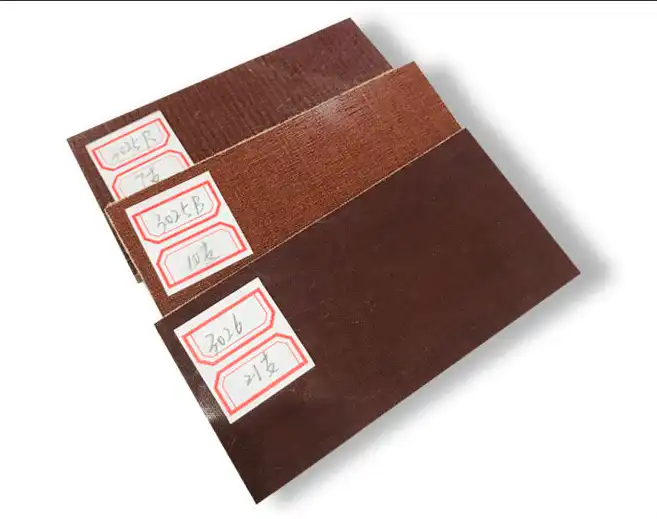Are Phenolic Boards a Viable Green Alternative in Industry?
Sustainable Raw Materials and Production
Phenolic boards are manufactured from renewable resources, primarily high-quality paper and natural fibers, ensuring a reduced dependence on non-renewable inputs. The phenolic resins that bind these raw materials are produced using environmentally responsible synthesis methods that significantly minimize harmful emissions and reduce ecological impact. In addition, modern manufacturing advancements have streamlined energy consumption, optimized production efficiency, and lowered overall waste output. These improvements have substantially decreased the carbon footprint of phenolic board production, positioning them as a greener, more sustainable alternative to traditional options such as metals, plastics, and other resource-intensive materials in various industrial applications.
Longevity and Reduced Waste
The remarkable durability of phenolic boards and phenolic resin sheet contributes directly to their extended service life, which in turn reduces the frequency of replacements and conserves valuable resources. This durability stems from their strong resistance to wear, corrosion, moisture, and environmental degradation, allowing them to perform reliably over long periods without compromising functionality. As a result, less waste is generated over time, supporting sustainable material use in both industrial and commercial settings. By minimizing disposal rates and extending the lifespan of end products, phenolic boards play a key role in reducing environmental impact and promoting circular economy principles in manufacturing.
Energy Efficiency in Application
Phenolic boards possess excellent thermal insulation capabilities, making them particularly valuable in applications where energy conservation is a priority. When integrated into construction projects, industrial machinery, or equipment enclosures, they help minimize heat transfer, resulting in lower heating or cooling demands. This enhanced thermal performance reduces energy consumption, cutting operational expenses and supporting carbon reduction initiatives. Over time, these savings contribute to improved environmental performance across multiple industries. By combining insulation efficiency with structural durability, phenolic boards align with global sustainability objectives and help organizations meet stricter energy efficiency standards without sacrificing functional or aesthetic requirements.
Low Emissions and Lifecycle Benefits in Industrial Use
Minimal VOC Emissions
One of the standout features of phenolic resin sheets is their low emission of volatile organic compounds (VOCs). Unlike many synthetic materials, phenolic boards release negligible amounts of harmful substances during their lifecycle. This characteristic makes them particularly suitable for indoor applications where air quality is a concern, such as in healthcare facilities or educational institutions.
Recyclability and End-of-Life Considerations
The recyclability of phenolic boards and phenolic resin sheet adds another layer to their eco-friendly profile. At the end of their useful life, these materials can be repurposed or recycled, reducing the burden on landfills. Some manufacturers have developed innovative processes to reclaim and reuse phenolic materials, creating a closed-loop system that further enhances their sustainability credentials.
Reduced Carbon Footprint in Transportation
The lightweight nature of phenolic boards compared to traditional materials like metal or concrete results in reduced transportation-related emissions. This weight advantage not only decreases fuel consumption during shipping but also allows for more efficient handling and installation, contributing to an overall reduction in the carbon footprint associated with their use in various industries.
Role of Phenolic Materials in Meeting Environmental Regulations
Compliance with Stringent Environmental Standards
As environmental regulations become increasingly stringent, phenolic boards are well-positioned to meet and exceed these requirements. Their low emission properties and sustainable production processes align with global initiatives to reduce industrial pollution and promote cleaner manufacturing practices. Many phenolic board products have obtained certifications that attest to their environmental performance, making them a preferred choice for companies aiming to comply with eco-friendly building codes and industrial standards.
Supporting Green Building Initiatives
The construction industry, in particular, has embraced phenolic boards and phenolic resin sheet as a means to achieve green building certifications. These materials contribute to improved energy efficiency, indoor air quality, and sustainable resource use – all key factors in green building rating systems like LEED (Leadership in Energy and Environmental Design). By incorporating phenolic boards, architects and builders can create structures that are not only environmentally responsible but also cost-effective and durable.
Advancing Circular Economy Principles
Phenolic boards play a significant role in promoting circular economy principles within manufacturing sectors. Their durability reduces the need for frequent replacements, while their potential for recycling and repurposing aligns with the "reduce, reuse, recycle" ethos. By choosing phenolic materials, industries can demonstrate their commitment to sustainable practices and contribute to the broader goal of creating a more circular, waste-minimizing economy.
Conclusion
The eco-friendliness of phenolic boards and phenolic resin sheet in sustainable manufacturing is undeniable. These versatile materials offer a compelling combination of durability, performance, and environmental responsibility. As industries continue to seek ways to reduce their ecological impact, phenolic boards stand out as a solution that doesn't compromise on quality or functionality. Their role in promoting energy efficiency, reducing waste, and supporting circular economy initiatives positions them as a key player in the future of sustainable manufacturing.
Contact Us
For more information about our eco-friendly phenolic resin sheets and how they can benefit your sustainable manufacturing practices, please contact us at info@jhd-material.com. Our team of experts is ready to assist you in making environmentally conscious choices for your industrial needs.






